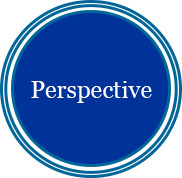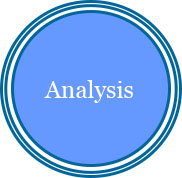- Bergen County Academies
- Research Philosophy
-
The foundations of the research program at BCA are deeply rooted in providing a real-world research environment for students to develop the independence, accountability, vision and drive to become outstanding members and future leaders within the science community. Our research program is based on six foundational principles, which work in concert with one another, to lay the groundwork necessary to nurture and challenge students to strive for excellence.


Perspective can be thought of as the jumping off point between traditional classroom teaching and independent research. Students gain perspective in three ways. First, they must be taught the basic principles, theories, and historical perspectives that have shaped and formed our current understanding of modern science.
The second perspective is personal. Students are asked what in science or society truly interests them, connects with them, or affects them. If given unlimited resources, what question would they want to study, and what problem would they want to solve. This internal perspective can be intimidating, but it allows students to begin to think like a scientist, and creates an immediate investment in the research. Since the student developed the idea, they feel a greater sense of accountability when it comes to its success or failure.
Students third gain perspective on the current state of science and research. Students must understand what research is currently being conducted by performing primary literature searches on their topic. This is an important, but difficult stage for the students. Understanding where to go to locate journal articles and how to dissect out the pertinent information is a skill that takes practice and patience, but will be valuable for the student beyond high school. Through the reading multiple papers on a topic, and with the guidance of the instructor, a student gains the perspective needed to develop the structure for their project, and insight into how and where research is done.

Students conducting independent research come to understand the purpose of their research on two scales. The first deals with the goals of the project. When developing the project and determining necessary experiments, students must understand the purpose of performing each experiment, the possible outcomes, and the goals that are to be achieved at each stage. Understanding the purpose of each experiment forces the abstract information gathered from the primary literature to be focused into a logical progression of tests throughout the project.
Next, the larger scale purpose of the research must also be considered by the student. This greater purpose normally coincides with the student’s reasons for wanting to do the project (the internal perspective previously mentioned). The perspective gained through background literature research kindles students understanding of the current state of the field and the importance of where the project would fit into the field. Thus, the greater purpose is understood by the student and is a motivator to work diligently to obtain meaningful results that may contribute to the greater body of knowledge on the subject.

The tools needed to carry out experimentation make up a portion of the students’ resources in a research project. Understanding how to use an instrument and obtain data, as well as determining the best tool to use for an experiment are important skills that a student develops in the experimentation stage of a project.
The techniques that a student learns mecome an important a resource. The experimentation stage of the project introduces students to techniques and skills, which through practice, precision, and dedication beget mastery. These skills are transferable to any future lab environment a student encounters. The quality of results in a project hinges on the careful execution of techniques and protocols by the student.
The final resource that is critical to student success is guidance by the mentor or instructor. Without a mentor who is patient and engaged in all stages of the independent research project, the techniques cannot be properly taught and the tools are rendered useless. The mentor watches over the student after teaching the tools and techniques, but it is the student who is responsible for the success or failure of a given experiment. Although the mentor is critical in guiding the student through the research project, they are not the only guide students must have have comfort reaching out to, learning to collaborate with other students, teachers, and professionals alike.

Collaborating with other mentors and professionals is important in order to develop additional techniques needed in the research project. Prior to discussing the research project with outside professionals, the student must fully gain confidence and understand the core concepts and methods of the project, question the topics that are still met with difficulty, and intelligently discuss the future direction of the project based on results. As collaboration is a critical part of professional research, it is also a critical step in preparing students for a future in science.
Collaboration with other students is also a necessary part of the independent research project. Students involved in research will collaborate in a peer to peer format, where students discuss topics, review others work, and provide feedback. This peer to peer collaboration is important for the students because it allows for independent growth in the project without the direct oversight and guidance of the mentor. When a student reaches the later stages of research, the student will also collaborate with others in more of a mentor role, where students who are newer to research or struggling with a technique or protocol can receive guidance from the more advanced student.

Running an assay or experiment is important in order to obtain data and results. Learning to analyze the results can be a more difficult task. Proper analysis includes dissection and interpretation of the data, plotting data into easy to understand visual charts, determination of statistical significance, and differentiatie neuances between correlation and causation.
In addition to analyzing the data, students must also analyze the research project as a whole. By analyzing the overall project, students ensure that the core concepts of the project are understood, that necessary and logical experiments were carried out, and that the data is meaningful and easily understood. Once all of the analysis has been carried out, the student is ready for the culminating stage of the independent research project.

The experience of carrying out a research project and putting into practice the information that is learned in the classroom is critical in this model, in order to change the way science is taught in this country. However, after all of the lab work and analysis is completed, it is necessary for a student to share the findings in the same way that a professional would. Students must compile the findings of the study in the form of a written report, poster, oral presentation, or in some cases, a publication. This process allows students to practice important presentation and technical writing skills that will be needed in future education and careers. This also allows the students to showcase work that they were involved in for months or even years, and receiving feedback in order to make improvements.

